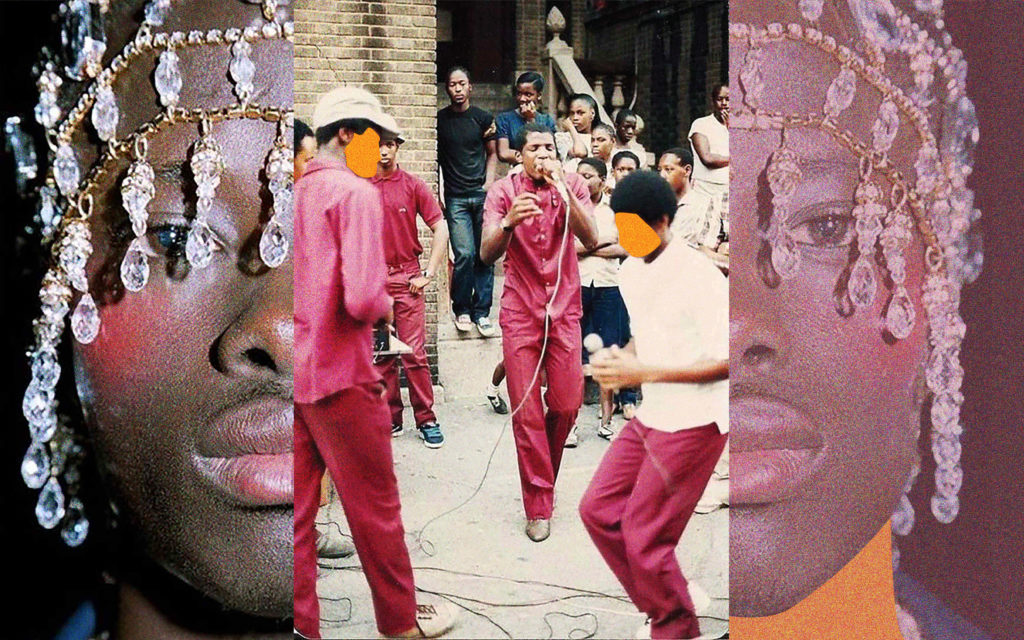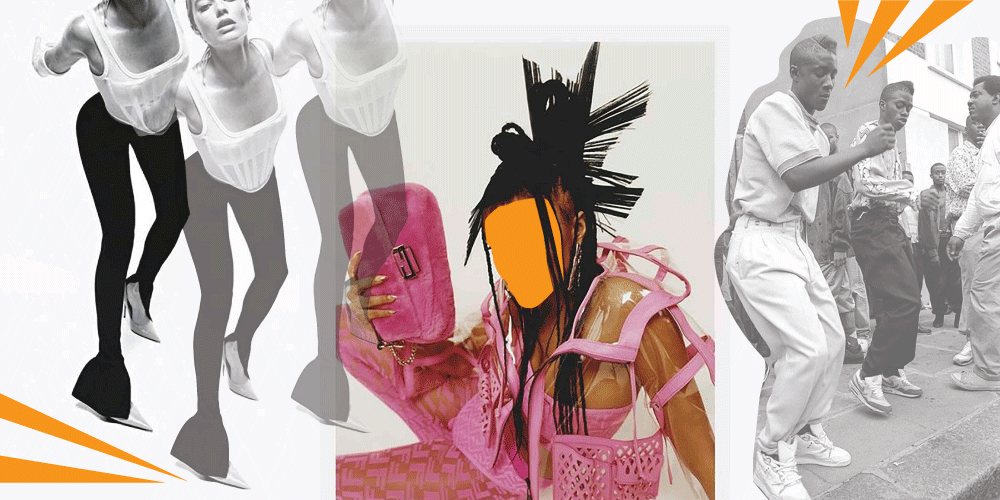There’s something about ’80s R&B that expresses joy. The extravagant uniforms, the perms, the campiness, the bright colors; the music speaks of a time where all people wanted to do was party. Men assuring women that not only could they dance all night, they would take care of them for all time; women assuring men that no obstacle could get in the way of their love or, often, more importantly, dancing. There was joy in how Chaka Khan screamed her love, DeBarge couldn’t resist the night-time rhythms, and Tony! Toni! Toné! kept it simple telling you to “Feel Good.” In June 2018 I was going through a phase of ’80s R&B and was quite taken by the music’s (or artists’) admonition to seize the joy. Ian, a co-worker and friend, was going to the Cinema Ritrovato festival in Bologna and asked if our friend Jordan and I would like to come. I had made a habit of offering empty promises to “think about it,” unwilling or unable to afford a weekend in Italy, but I was working two jobs, payday was close, and I could source some cheap airfare from a corporate hook-up.
“Are you up for it?” Jordan asked
And, surprisingly I was. I bought the tickets, Jordan booked the Airbnb, and as the date neared I had delved deeper into the ’80s, listening to Rick James’s pleas for more of that “sweet funky stuff” making me pack clothes that matched my effervescent mood; pink shirts, neon green, all bright diversions from my usual dark palette. I was struck with the inexplicable compulsion to buy dungarees, which I ignored at the time, but now regret. Other than the slight hiccup of Jordan leaving his passport at home and having to rush back home to get it — thank goodness the flight was delayed and we got to Bologna. At 1 a.m., exiting the taxi and walking up to the house, the ’80s high had worn off, but luckily my friend was there to gather the joy for both of us.
“We are going out tonight.”
He called Ian and we found him amongst his group of festival veterans in an Irish pub, the only thing to stay open that late in Bologna. The late-night chat around beers whose taps definitely needed their lines cleaned, those the early hours of a Saturday morning seemed very British. And it was. We were the only ones there, but it was refreshing to see people without the furrows of anxiety that come with just existing in London. The freedom bestowed by the knowledge that all anyone had to do tomorrow was to wake up and go watch some brilliant, carefully restored cinema.
We woke up the next day, and I got in the shower, with my fishnet sponge and shower gel, still incredibly happy that my oversized tub of cocoa butter had passed through customs. I put on the ’80s playlist and sang to DeBarge’s “I Like It.” I’d been in Bologna for only six hours, but I was loving it. After a quick coffee and a “Through The Fire” duet with Jordan, my skin shining, my afro just the right kind of messy, we rolled out. Short-sleeved shirts rolled up, tucked in, we walked through the piazzas with a sprightly step and I imagined a crane following our every move. Let this groove, get you to move, everything was alright. Our joy was impatient, and we immediately ordered some subpar pizza realizing that the heat of the day and the beauty of the city couldn’t be missed. It would be sacrilegious to sit inside a movie theater and not walk through the city, so we bought a couple of beers and began walking, marveling at the architecture, sweating, Jordan being very careful not to burn. We talked of food and our disappointment in the pizza we had just eaten. Jordan and I are dedicated home cooks, meticulously planning meals, watching every YouTube cooking channel, experimenting when we can. Most of our discussions involve what we cooked, how we did it, and how delicious it was. We would even go so far as to craft cocktails and drink pairings for our meals, so as we walked past a nondescript restaurant advertising a negroni for five euros, we had to stop because any negroni for that low a price is a bargain. The restaurant was Chiaro De Luna, Moonlight, and under their charming masquerade was something we would have never expected.
The negronis were delightful, we drank and danced around the table, timed movements of switching seats so that Jordan didn’t burn, ready now to attempt another Italian dish, Jordan suggested a plate of tortellini. We decided to share a plate, and the waitress, quite amused at our enthusiasm, brought out another plate of Aperitivo for the wait. The plate came, and the small intricately folded pasta hiding sweet treasures within those folds was covered in an abundance of ragu. The white expanse of the plate just served to enhance the richness of the food. We both took a bite and began to rock; we couldn’t be steady, we kept rocking. While Jordan took his fork trying to figure out if there was a secret ingredient he could dissect from the sauce, I was fully Black-reacting, exclaiming, worshipping, thanking God in all his iterations. This was a joy we couldn’t comprehend, it deserved another plate, purely for understanding’s sake. Another order of negronis, we took to the next plate, but the effect hadn’t diminished, the exultations grew louder, the waitresses smirked at us. How were we the only ones here? We immediately became proselytizers, thanking them profusely and leaving them a huge tip. We walked again with our feet light, the scales removed from our eyes, the blinding moonlight calling us to a new kind of living. I thought of people I could call just to tell them I love them, those words meaning everything right now. As we walked down the street, to meet Ian for a pizza, one I cannot even remember. We leaned on each other, walking towards the restaurant, both of us rehearsing our sermon, and like the zealots, we were, unloaded onto the unsuspecting group of festival-goers, the conversation would soon divert to film, but our complete faith in the food we had just eaten was witnessed, and I think it made an impact.

Jordan wanted to get cigars and feeling the need to complete the Italian look I joined him. As we walked up to the shop, we passed a teenage couple, the boy sadly devoid of joy, asked us if we were together. This wasn’t an innocent question; it was said in the same tone I had regularly heard British people ask me “where are you from?.” It was a mocking question asked so that the interrogator could confirm what they had already decided: you don’t belong.
I thought about the people who were instrumental in the boom of ’80s R&B: the Black community and the LGBTQ community. The performers, usually Black, not only had to contend with the intense racism of American life but the realities of their neighborhoods wracked with the crack epidemic. The War on Drugs was raging, and Black men were being incarcerated, prisons full of desperate people who only saw one way out of the poverty the US government had forced onto them. Communities broke down and people were destroyed by addiction, the same drug addiction that is now running rampant through poor white communities with the opioid crisis. The only difference being the sympathetic calls for action given to people caught up in prescription addiction, as opposed to the disdainful vilification of the Black addict in the ’80s; it’s not given now. The gay clubs and DJs that made these records big, part of communities that were being slowly killed by the AIDS crisis. Again, the government ignored their pleas for help, intent on allowing people they had decided didn’t belong to die.
I had come to realize that joy was essential for these people, they had to scream with joy, they had to talk about love, they had to dance into the night and they had to talk about sweating on the dancefloor because they were sweating under police brutality or from the virus quickly destroying their bodies. I thank them for the joy that they expressed to us, and I will strive to make sure everyone can dance and feel joy in my presence, especially if when they leave, they might have to return to grief and oppression.

We asked the boy whether the girl he was walking with was his girlfriend, throughout this whole exchange she had been bashful, embarrassed with his blunt questioning of two tourists. He pointed to her and said:
“Yes. I fuck this.”
I watched as Jordan’s eyebrows raised, and I could catch his thoughts so apparently expressed: “Yeah . . . probably not for much longer ”
The statement, devoid of care and humanity confirmed my thoughts. If you can call someone you care about “this” maybe you don’t deserve joy. We walked on, somewhat shocked out of the joy, but with a deeper motivation to find it again, and strolled into the cigar shop. Jordan bought two cigars, and we went to sit in a park with beers that came in plastic cups from a nearby vendor, as we laid down in the sun with a forgiving breeze. He smoked his cigar, I tried to smoke mine, coughed for five minutes and gladly gave up . We laid there for a few hours, talking of our dreams, goals, movies we’d make, stories we’d tell and poems we’d write. We talked of family trouble, he talked of the love of his girlfriend, still hesitant and tentative at the time, but it would soon grow strong and ardent. I talked of family and anxiety, loneliness and fear. Our expressions of fear connected us, and like the ballads of the eighties, we didn’t want responses or solutions, just the freedom to trade our musings and panics.
I didn’t watch a movie that weekend, not that I wasn’t presented with the opportunity. We sat in the piazza and watched a movie on an arc lamp projector. So, settled with negronis, pasta and bread that the sparks flying from the machine sent me to sleep. I woke to Ian and Jordan raving about the magic of cinema, the magic of film projection, watching fire blast from the top of some great iron box to make a picture move against the wall of the church in front of you.
The next day, we had tortellini at Chiaro Di Luna the first chance we could get, and reluctantly met Ian for another pizza, but went straight back for some more negronis. Slowly throughout the afternoon, other festival-goers from London stopped to talk with us, they all walked past the restaurant and seeing these drunk prophets of tortellini sitting at their church, joined the service. We needed them to witness the miracle, so I ordered another plate of tortellini and the waitress sadly told me that they had closed the kitchen. Dejected and disappointed, I went to use the bathroom and the waitress introduced me to the chef.
“Thanks for liking my tortellini.”
And I just had to convey my joy to him. “My guy, I like it, I’ll walk through the fire for these tortellini, there could never be too much tortellini, I’ve just gotta be real. Your tortellini are divine, it’s ambrosia, it’s fit for royalty.”
I drunkenly swayed in my poetic praise, so determined for him to know how much I loved his pasta. I was probably incredibly loud. I got back and sat down, with an hour to go for our flight’s gate to close and still no idea of how to get to the airport, I ordered another negroni. The waitress came out and tapped me on the shoulder: Do you still want the tortellini? The chef said he’ll open the kitchen for you.
I’ve been thinkin’
‘Bout you for quite a while
You’re on my mind everyday and every night
My every thought is you, the things you do
Seems so satisfying to me
DeBarge, “I Like It” •




